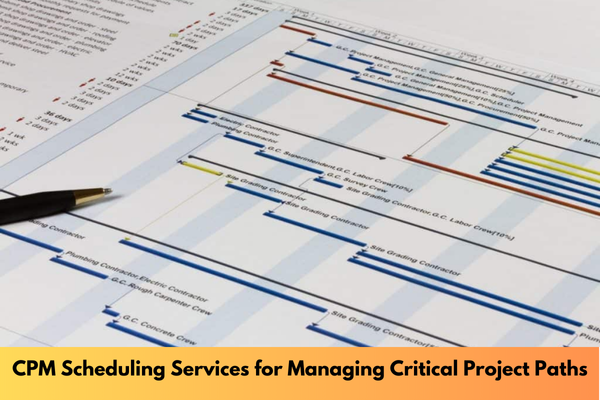In the world of project management, keeping a project on track and ensuring that it is completed within budget and on time is crucial. One of the most effective tools used for this purpose is Critical Path Method (CPM) scheduling. CPM scheduling services, especially when integrated with tools like Precision Estimator, are essential for managing critical project paths in construction and other industries. These services help project managers identify the most crucial tasks, optimize timelines, and minimize delays, ensuring smooth execution from start to finish.
What is CPM Scheduling?
CPM scheduling is a project management technique used to plan and manage the sequence of tasks that are necessary for the completion of a project. It focuses on identifying the longest stretch of dependent activities and determining the minimum project duration. The “critical path” refers to the sequence of tasks that directly impacts the project timeline. Any delay in tasks on the critical path results in a delay in the entire project. Hence, managing these critical paths is vital to ensure timely project completion.
CPM scheduling involves creating a visual representation of project tasks, their durations, and their dependencies. The method helps in identifying tasks that are critical to the project’s success and those that have some flexibility, allowing project managers to allocate resources effectively and mitigate potential delays.
How CPM Scheduling Services Help in Managing Critical Paths
1. Identifying Critical Tasks
CPM scheduling services help project managers quickly identify the tasks that must be completed on time for the project to proceed as planned. With tools like Precision Estimator, the critical path is automatically highlighted, making it easier to spot potential delays early on. By understanding which tasks are critical, project managers can allocate resources more efficiently, prioritize tasks, and avoid bottlenecks that might occur on non-critical tasks.
For example, in construction projects, the installation of HVAC systems or electrical wiring may depend on the completion of structural work. Any delay in the critical tasks could push back the entire project, leading to cost overruns and dissatisfied clients. CPM scheduling ensures that these dependencies are well-managed and tracked in real-time.
2. Optimizing Project Timelines
With precise scheduling, contractors and project managers can optimize the timeline of the entire project. Using CPM scheduling services, they can estimate the total duration of the project and allocate time efficiently to each task. This helps to avoid over- or under-estimating the time required for each stage of the project.
For example, Precision Estimator can be used to calculate the time required for specific tasks like excavation, foundation laying, or framing in a construction project. By optimizing the scheduling and ensuring that tasks are completed on time, CPM scheduling helps reduce the overall project timeline, potentially leading to faster project delivery and higher profits for contractors.
3. Mitigating Risks and Delays
Every project comes with its own set of risks, including delays in material deliveries, weather conditions, or labor shortages. CPM scheduling services provide visibility into how these delays affect the critical path. By identifying potential risks early, project managers can make informed decisions, reschedule tasks, or allocate additional resources to prevent delays in critical activities.
With tools like Precision Estimator, project managers can plan for various scenarios and establish contingency measures. For example, if a delay is expected in a critical task, they can adjust the schedule to move forward with other non-critical tasks, thus preventing the entire project from stalling.
4. Resource Allocation and Budget Management
One of the primary advantages of CPM scheduling services is the ability to track resource allocation. By understanding the critical path, project managers can assign the right resources to the right tasks at the right time. This ensures that key tasks receive the necessary attention, and resources are not stretched too thin.
Additionally, CPM scheduling helps in managing budgets. It allows for a clear view of the time and resources needed for each task, which helps in creating more accurate cost estimates. For contractors using Precision Estimator, this integration ensures that the budgeting process is tightly linked to the scheduling of tasks, reducing the chances of cost overruns.
5. Enhancing Communication with Stakeholders
CPM scheduling services, particularly those integrated with estimation software like Precision Estimator, improve communication with project stakeholders. When all tasks and their dependencies are clearly outlined in a CPM chart, it becomes easier to explain progress to clients, team members, and other stakeholders. This level of transparency builds trust and ensures everyone is on the same page.
Project updates, changes to the critical path, or delays can be communicated effectively, allowing for quicker decision-making. For clients, this transparency can improve satisfaction and make them more likely to trust the contractor with future projects.
Conclusion
CPM scheduling services are an indispensable tool for managing critical project paths, especially in industries like construction, where time and resources are crucial. By using advanced tools like Precision Estimator, contractors and project managers can optimize schedules, reduce risks, and allocate resources more effectively. With a clearer understanding of which tasks are critical to project success, they can make smarter decisions, manage delays proactively, and ensure that projects are completed on time and within budget.



